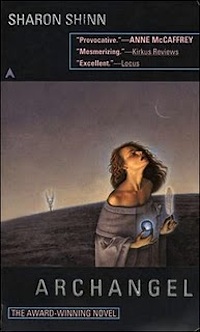If I can find three examples of something, that’s enough for me to consider it a subgenre. “God is a spaceship” is a subgenre, though a rather odd one. The first thing is that God is a spaceship — there’s a spaceship which has apparently godlike powers and which the characters truly think is God, but which the reader can recognise as being technological. Then there’s a planet, inhabited by people who know God is real, and up there in orbit keeping an eye on them. The first example is Frank Herbert’s Destination Void (1966) sequence, of which the most memorable is The Jesus Incident (1978). Then there’s Orson Scott Card’s Homecoming Saga (1992-95). And there’s Sharon Shinn’s Samaria series, which begins with Archangel (1996). David Weber’s Off Armageddon Reef (2007) is clearly doing something related.
It’s Archangel I’ve just re-read and which has made me think about what a very odd idea this was for somebody to write about even once. You have a planet. You have people on it, who all live at a specified tech level according to the will of God. And God is quite explicitly a computer. Archangel is a traditional romance story set on this strange planet. The joy of the book is simultaneously exploring the weird world and seeing the characters God has destined for each other struggle with that. They’re great characters. Oh, and one of them is an angel—a literal winged angel who can fly half way across the continent. Genetic engineering, of course.
I read Archangel in 1997. I’m fairly sure I read it from the library because somebody recommended it online, and then bought the paperback because I liked it. I’ve generally enjoyed Shinn’s work since, but I got bored with the later books in this series, which got in the way of my remembering how much I enjoyed this first one. The thing that makes this so great is the slowly unfolding hints about the way the world is and how it got to be that way. The later books tell you too much, and didn’t have characters I liked so much, so the absurdity of the whole thing started to annoy me. I am very good at suspending my disbelief as long as I am having fun. Tell me a story and am already inclined to believe. I will go along with the most ridiculous things as long as the story holds me. If I start to nitpick about science you have already lost me. So for me this is an example of a series that starts out great and fades out. Read the first one, then stop.
So in Archangel I bought the angels who could really fly, who had to have children with mortals, whose God was interested in genetics and who tracked everyone though the “kiss” implanted in their arm at birth. I had no problem with the evil atheist archangel Raphael, or the weather control, or the extremely nice nomads. I thoroughly enjoyed the plot and putting the world together. I liked Rachel, the girl who had been a nomad and a slave and was now to marry the archangel Gabriel and be angelica whether she wanted to or not. I enjoyed it again reading it now—Shinn’s a good writer, she writes things that are easy to sink into.
But I can see that there’s a potential scientific issue with the series—which is interesting. This is a series that looks like fantasy. It looked like fantasy in 1997, and it looks even more like fantasy now. “An excellent fantasy romance” says the cover quote (from Locus). But when you read it, God is a computer and it’s not fantasy at all, it’s science fiction, and finding out the way that it’s SF is half the fun. But if the science is silly then is it fantasy after all? Actually, no. having bad science doesn’t make something fantasy, it just makes it SF with bad science. Handwave science is an honourable SF tradition. Maybe it isn’t possible to genetically engineer humanoid angels who couldn’t really fly, but never mind.
The “romance” part of that quote is accurate, though. And what we have here is an old-fashioned romance. Actual romance novels aren’t like this any more. Shinn gives us two great characters destined for each other who fight and argue and have misunderstandings all through the book and only kiss on the last page. Along the way we have last minute rescues, we have God smiting, we have a world and several human and angelic societies to explore, and we have a number of very interesting minor characters. Shinn is good at people, she’s good at people from weird cultures and getting the feel of them right.
I picked this up to re-read now because I read a deeply enthusiastic review from Calico Reaction which reminded me how much I had enjoyed it when I first read it.
Jo Walton is a science fiction and fantasy writer. She’s published two poetry collections and eight novels, most recently Lifelode. She has a ninth novel coming out in January, Among Others, and if you liked this post you will like it. She reads a lot, and blogs about it here regularly. She comes from Wales but lives in Montreal where the food and books are more varied.










